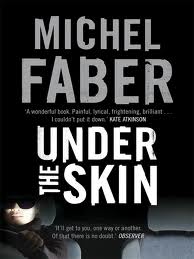Our book group choice for October 2007 is Under the Skin by Michael Faber. A lone female scouts the Scottish Highlands in search of well-proportioned men and the reader is given to expect the unfolding of some latter-day psychosexual drama.
The novel is set on the east coast of Scotland and follows Isserley, an alien who has been surgically altered to look like a human woman. Isserley drives a black van around the countryside, picking up male hitchhikers and drugging them. She then takes them to a processing plant where they are killed and their bodies are turned into food for her people.
The novel is told from Isserley’s point of view, and she is a complex and sympathetic character. She is clearly intelligent and capable, but she is also deeply traumatized by her experiences on Earth. She is haunted by the memories of her own people, who were killed by humans, and she is increasingly aware of the violence and cruelty of human society.
As the novel progresses, Isserley begins to question her role in the abduction and killing of humans. She starts to see the hitchhikers as individuals, rather than just as food, and she begins to feel empathy for them. She also begins to question the morality of her people’s actions, and she eventually decides to help one of the hitchhikers escape.
Under the Skin is a thought-provoking and disturbing novel that explores the nature of identity, consciousness, and the relationship between humans and other species. The novel is also a powerful indictment of the violence and cruelty of human society.
Here are some of the themes explored in the novel:
- The nature of identity: Isserley is an alien who has been surgically altered to look like a human woman. This raises questions about what it means to be human, and whether our identity is determined by our biology or our experiences.
- The relationship between humans and other species: The novel explores the relationship between humans and the aliens who are abducting and killing them. This raises questions about the ethics of eating meat, and about the way that we treat other species.
- The violence and cruelty of human society: The novel is full of scenes of violence and cruelty, both against humans and against animals. This raises questions about the nature of violence, and about the way that we treat each other.
Under the Skin Discussion Questions
- Would you call the book enjoyable? Is there anything you particularly liked or disliked about it?
- This book has been described as a satire (an allegorical satire like Animal Farm). Should writers try and change the way we think about things? Is this attempt successful?
- Did you find the characters credible? Isserley is criticised in a review in The New Statesman as “frustratingly under-developed.”
- Do you sympathise with Isserley?
- Isserley and Eswiss know much more than the other ‘humans’ on the farm. In fact, Eswiss has even more contact with people of both sexes – why don’t they both rebel earlier. Is Eswiss “just following orders”?
- Does the novel hold together logically? Where there any glaring lapses or loopholes?
- What do you think about the author’s use of language? What effect do you think he might have been trying to achieve?
- Is Isserley redeemed? If so, is there a particular episode that hints to her growing awareness?
- Amliss Vess and Isserley’s relationship: a review condemned Isserley as “more like an anxious adolescent than a woman embarked on a complicated mission of self invention.” Is this a fair critique? Was Amliss a believable character or just a catalyst for Isserley’s change of heart?
- Did you have a favourite hitcher? Where they characters or just caricatures?
- What do we learn about human psychology?
- Just for fun: describe your mental image of humans as they are described in the book.
Individual Ratings
DKB Rating 





